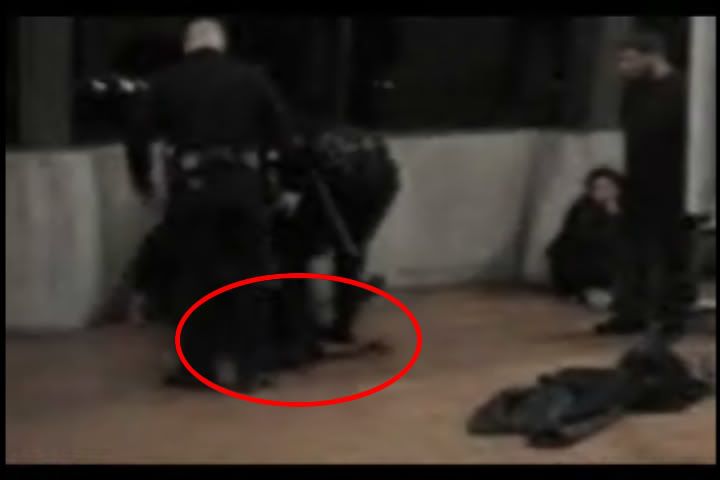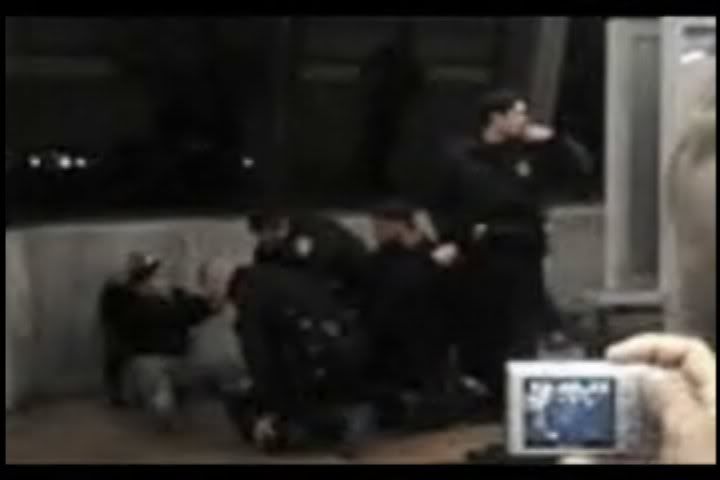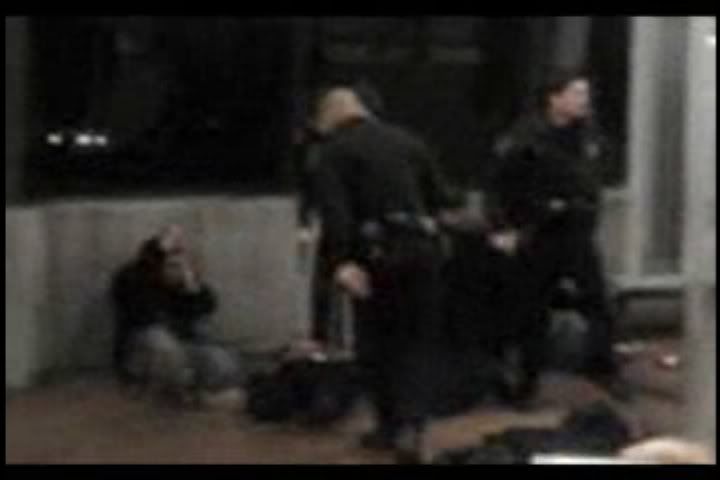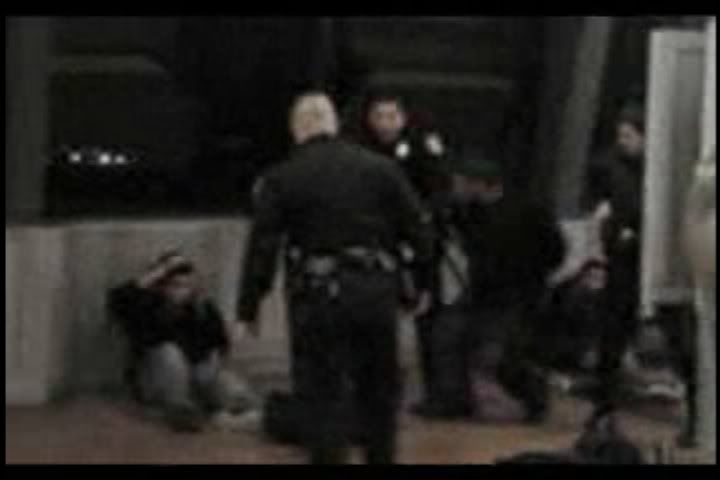Friday, January 23, 2009
Mehserle did have a Taser, did get control of Grant's arm
A few updates on the shooting of Oscar Grant by BART officer Johannes Mehserle.
BART is now referring questions to the Alameda DA, who is pretty tightlipped. DA spokesman John Creighton would not tell me whether Grant and his cohorts had been searched before the fatal incident. (Michael Rains, an independent legal consultant cited by AP, claims that Grant and his fellow detainees had not yet been searched when Officer Mehserle was called in.)
Creighton did confirm that the officers at the scene were equipped with Tasers, but would not tell me if there were any reports of Officer Mehserle giving verbal Taser warning.
I also managed to find what seem to be full resolution (not high resolution) versions of the two cell phone videos of the shooting. They show some important facts.
Frame-grab (at 1:40), a few seconds after the shooting. Circled in red is the mortally wounded Mr. Grant, his un-cuffed right arm lying out to his side.
2, Officer Mehserle DID get control of Grant’s arm, and got it around behind Grant’s back, before shooting.
Earlier in the above video (1:15-1:21), it looks as if Mehserle is unable to get control of Grant’s arm, but the second video, taken from further to the left , shows that Mehserle DID get control of Grant’s arm (at 30-32).
Does this mean that Officer Mehserle had no legitimate reason to escalate? No, because Mehserle had to fight to get control of Grant’s arm. Remember Michael Rains’ claim that Grant had not yet been searched. With Grant fighting to keep his arm underneath his body, Mehserle had to have been concerned that Grant might've been going for a weapon. That concern would justify pulling either a Taser or a gun, but Mehserle’s couldn’t go for either immediately. His first priority would be getting control of Grant’s arm, so that if Grant did have a gun, the situation wouldn’t turn into a shootout. Thus it makes sense that while he was fighting for Grant's arm, he would have also been thinking of accessing a weapon, so that has soon as he did get control of Grant's arm, he did reach for a weapon (the appropriate weapon at that point being his Taser).
If Mehserle thought he was grabbing his Taser, then the entire sequence makes perfect sense, and it is easy to see how Mehserle might have confused his pistol for his Taser, since until he got control of Grant’s arm, he couldn't have known which Instrument would be called for.
Note also that as soon as Mehserle starts fumbling for his pistol (the fumbling is an indication that he thought he was grabbing his Taser), Grant manages to buck the other officer (the officer with the close-cropped hair) off of his neck. This starts a struggle with the close-cropped officer that lasts until Mehserle finally manages to get his gun out (at 35).
Here is a frame-grab from the first video, showing the end of this struggle, where the close-cropped officer is just getting his knee back on top of Mr. Grant's neck (at 124):

Officer Mehserle (behind) is just getting his gun clear of his holster.
In the next second the close-cropped officer either gets a verbal warning, or sees that Mehserle’s gun is drawn, prompting him to pop up and away from Grant, just before Officer Mehserle fires. Here is the fatal moment (at 126):

A moment later (at 127) Mehserle looks up in horrified surprise:

Taser vs. gun : compliance vs. defense
From the other angle (at 35-37) it seems that just before Mehserle fires, Grant might even be trying to pull his own arms up behind his back. If Mehserle thought he was using his Taser, his failure to instantly re-assess Grant’s compliance is less than ideal, but seems unexceptional. The only issue with the Taser in this situation is whether Grant is complying, and an instant before, he had not been complying.
If Mehserle knew he had his gun in his hand, the standard is completely different. Like anyone else, a police officer can only shoot in order to defend himself or others against imminent threat of grave bodily harm. Because Mehserle had succeeded in getting Grant’s arm under control, Grant did not present any imminent threat, leaving no justification for the use of deadly force.
The fact that Mehserle DID get control of Grant’s arm makes it that much more likely that he confused his pistol for his Taser
Once Mehserle got control of Grant’s arm, going for his Taser is perfectly understandable. Going for his gun makes no sense at all. If he intended to go for his gun at that point, then the shooting was just an execution and Mehserle should be put away for it, but this is a far less plausible explanation than Taser confusion.
The only contra-indication to Taser confusion is Mehserle's failure to speak up. If he did experience Taser confusion, he has gotten very bad legal advice. As prosecutors asserted in the Marcia Noriega case, there is no criminal liability for Taser confusion, but Mehserle has to make that case. If he doesn’t make to the DA, he’ll have to make it to a jury, in a case where, if had offered the Taser confusion explanation earlier, the DA would have almost been precluded from filing charges in the first place. Yikes.
Given the strength of the Taser-confusion defense, I’m guessing that Mehserle must not have given a verbal Taser warning. With such concrete evidence of Taser confusion, the DA would know that reasonable doubt is a certainty and could not responsibly bring any charges, never mind murdercharges, even without Mehserle himself speaking up.
Failure to issue a verbal Taser warning will make it harder for Mehserle to establish a Taser confusion defense, no matter how true the defense is. That is a good point for other officers to remember. Giving a verbal Taser alert will not help to stop Taser confusion, but it should help officers who experience Taser confusion from being wrongly convicted on criminal charges.
An innocent Mesherle (by far the most likely case) should still be able to mount a solid Taser confusion defense based on the reasonableness of using his Taser, his extended fumbling to get his gun out of its holster, and his shocked surprise when the gun went off, but good luck to anyone trying to get race-neutral justice from an Alameda County jury.
BART is now referring questions to the Alameda DA, who is pretty tightlipped. DA spokesman John Creighton would not tell me whether Grant and his cohorts had been searched before the fatal incident. (Michael Rains, an independent legal consultant cited by AP, claims that Grant and his fellow detainees had not yet been searched when Officer Mehserle was called in.)
Creighton did confirm that the officers at the scene were equipped with Tasers, but would not tell me if there were any reports of Officer Mehserle giving verbal Taser warning.
I also managed to find what seem to be full resolution (not high resolution) versions of the two cell phone videos of the shooting. They show some important facts.
1. Oscar Grant was NOT handcuffed at the time of the shooting. Immediately after the shooting, Mr. Grant can be seen with his arms behind his back. The fact that his arms stayed behind his back after he was mortally wounded has led some to claim that Grant had to have been handcuffed at the time of the shooting. This is immediately disproved however, when a few seconds later the two officers turn Grant over and his arm falls freely to the ground:

Frame-grab (at 1:40), a few seconds after the shooting. Circled in red is the mortally wounded Mr. Grant, his un-cuffed right arm lying out to his side.
2, Officer Mehserle DID get control of Grant’s arm, and got it around behind Grant’s back, before shooting.
Earlier in the above video (1:15-1:21), it looks as if Mehserle is unable to get control of Grant’s arm, but the second video, taken from further to the left , shows that Mehserle DID get control of Grant’s arm (at 30-32).
Does this mean that Officer Mehserle had no legitimate reason to escalate? No, because Mehserle had to fight to get control of Grant’s arm. Remember Michael Rains’ claim that Grant had not yet been searched. With Grant fighting to keep his arm underneath his body, Mehserle had to have been concerned that Grant might've been going for a weapon. That concern would justify pulling either a Taser or a gun, but Mehserle’s couldn’t go for either immediately. His first priority would be getting control of Grant’s arm, so that if Grant did have a gun, the situation wouldn’t turn into a shootout. Thus it makes sense that while he was fighting for Grant's arm, he would have also been thinking of accessing a weapon, so that has soon as he did get control of Grant's arm, he did reach for a weapon (the appropriate weapon at that point being his Taser).
If Mehserle thought he was grabbing his Taser, then the entire sequence makes perfect sense, and it is easy to see how Mehserle might have confused his pistol for his Taser, since until he got control of Grant’s arm, he couldn't have known which Instrument would be called for.
Note also that as soon as Mehserle starts fumbling for his pistol (the fumbling is an indication that he thought he was grabbing his Taser), Grant manages to buck the other officer (the officer with the close-cropped hair) off of his neck. This starts a struggle with the close-cropped officer that lasts until Mehserle finally manages to get his gun out (at 35).
Here is a frame-grab from the first video, showing the end of this struggle, where the close-cropped officer is just getting his knee back on top of Mr. Grant's neck (at 124):

Officer Mehserle (behind) is just getting his gun clear of his holster.
In the next second the close-cropped officer either gets a verbal warning, or sees that Mehserle’s gun is drawn, prompting him to pop up and away from Grant, just before Officer Mehserle fires. Here is the fatal moment (at 126):

A moment later (at 127) Mehserle looks up in horrified surprise:

Taser vs. gun : compliance vs. defense
From the other angle (at 35-37) it seems that just before Mehserle fires, Grant might even be trying to pull his own arms up behind his back. If Mehserle thought he was using his Taser, his failure to instantly re-assess Grant’s compliance is less than ideal, but seems unexceptional. The only issue with the Taser in this situation is whether Grant is complying, and an instant before, he had not been complying.
If Mehserle knew he had his gun in his hand, the standard is completely different. Like anyone else, a police officer can only shoot in order to defend himself or others against imminent threat of grave bodily harm. Because Mehserle had succeeded in getting Grant’s arm under control, Grant did not present any imminent threat, leaving no justification for the use of deadly force.
The fact that Mehserle DID get control of Grant’s arm makes it that much more likely that he confused his pistol for his Taser
Once Mehserle got control of Grant’s arm, going for his Taser is perfectly understandable. Going for his gun makes no sense at all. If he intended to go for his gun at that point, then the shooting was just an execution and Mehserle should be put away for it, but this is a far less plausible explanation than Taser confusion.
The only contra-indication to Taser confusion is Mehserle's failure to speak up. If he did experience Taser confusion, he has gotten very bad legal advice. As prosecutors asserted in the Marcia Noriega case, there is no criminal liability for Taser confusion, but Mehserle has to make that case. If he doesn’t make to the DA, he’ll have to make it to a jury, in a case where, if had offered the Taser confusion explanation earlier, the DA would have almost been precluded from filing charges in the first place. Yikes.
Given the strength of the Taser-confusion defense, I’m guessing that Mehserle must not have given a verbal Taser warning. With such concrete evidence of Taser confusion, the DA would know that reasonable doubt is a certainty and could not responsibly bring any charges, never mind murdercharges, even without Mehserle himself speaking up.
Failure to issue a verbal Taser warning will make it harder for Mehserle to establish a Taser confusion defense, no matter how true the defense is. That is a good point for other officers to remember. Giving a verbal Taser alert will not help to stop Taser confusion, but it should help officers who experience Taser confusion from being wrongly convicted on criminal charges.
An innocent Mesherle (by far the most likely case) should still be able to mount a solid Taser confusion defense based on the reasonableness of using his Taser, his extended fumbling to get his gun out of its holster, and his shocked surprise when the gun went off, but good luck to anyone trying to get race-neutral justice from an Alameda County jury.
Comments:
<< Home
The line of reasoning provided in this analysis starts with an assumption there was no pre-meditated intent on the part of Mehserle to shoot Grant during the arresting process. If Mehserle had entered the event "fed-up" and high strung from the events that happened earlier, it is conceivable that he could have snapped. Under this state of mind, where he had intended to shoot Grant with pretend confusion and shock later, the taser confusion defense would not stand.
Post a Comment
<< Home

